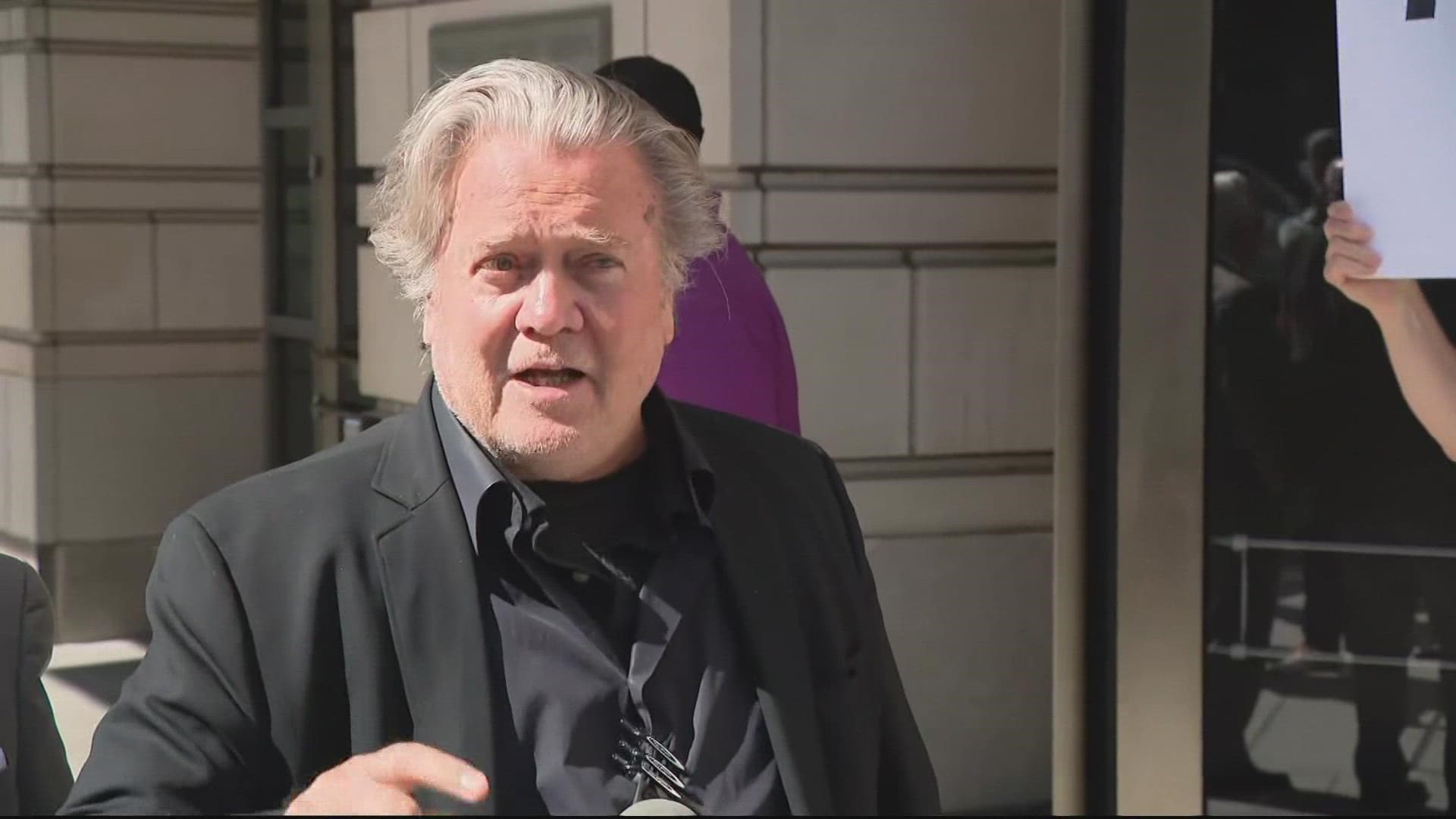WASHINGTON — Steve Bannon never complied in any way with the January 6th Committee’s subpoena to testify, jurors heard Wednesday, even after an 11th-hour offer to do so just days before his trial.
U.S. District Judge Carl Nichols allowed two letters sent by Bannon and former President Donald Trump on July 9 into evidence Wednesday afternoon over objections by prosecutors. In the letters, Trump claimed to be informing Bannon he was waiving executive privilege – something the committee says was never invoked in the first place, which Trump attorney Justin Clark reportedly confirmed in an interview with the FBI earlier this month. In Bannon’s letter to the committee, he said Trump’s waiver would allow him to testify. Before allowing the letters into the trial, Nichols had to warn jurors the claims should not be treated as facts in the case.
“Mr. Bannon’s belief that questions around executive privilege excused him from complying with the subpoena are irrelevant in this case,” Nichols said. “In addition… whether or not in the future Mr. Bannon complies with the subpoena is irrelevant to whether Mr. Bannon was in default in October 2021.”
Prosecutors argued vigorously against admitting the letters, since Nichols last week ruled the law barred Bannon from arguing executive privilege shielded him from testifying. Assistant U.S. attorney Amanda Vaughn told Nichols the letters would only serve to confuse jurors.
During questioning of committee general counsel Kristin Amerling, Vaughn asked if those letters had changed anything about the case since Bannon’s deposition date came and went on Oct. 14 of last year.
“Has the defendant provided any documents since his sudden offer to comply on July 9?” Vaughn asked.
“Not unless he’s provided some since I’ve been sitting here today,” Amerling said.
Prosecutors have described Bannon’s July 9 letter as a last-minute bid to escape consequences, telling Nichols in a hearing last week they viewed it as a “different form of contempt and obstruction.” In court Wednesday, Vaughn asked Amerling if Bannon had made such an offer at any point prior to July 9 – including in January, when the Supreme Court denied Trump’s request to hear an appeal of his lawsuit attempting to shield documents from the community through executive privilege. Amerling said Bannon hadn’t offered to comply after that hearing or at any point before or after until the July 9 letter.
“When, in relation to this trial, did this sudden offer of compliance come?” Vaughn asked.
“I think it came into my inbox a little after midnight on July 10,” Amerling said.
“And July 10, how long before trial was that?” Vaughn asked.
“A matter of days,” Amerling said.
Process and Protest
Nichols began the morning by vowing to keep the trial from becoming a “political circus” or a “forum for partisan politics.” That was put to the test in repeated objections by the government when Bannon defense attorney Evan Corcoran asked Amerling about her history on the Hill and her association with assistant U.S. attorney Molly Gaston, one of the prosecutors on the case.
Under questioning from Corcoran, Amerling said she and Gaston had overlapped as staffers on a committee chaired by former Rep. Henry Waxman (D-CA) more than a decade prior. She also said she and Gaston were members of the same book club – which Corcoran asked repeatedly about – although she hadn’t attended for more than a year and couldn’t remember the last time they’d crossed paths.
Corcoran also repeatedly brought up the 202 Republicans who voted “nay” in the 229-202 vote by the full House to hold Bannon in contempt of Congress. At one point, Corcoran asked FBI Special Agent Stephen Hart, the prosecution’s second and final witness in the case, if he’d interviewed the 200+ members of Congress who voted not to hold Bannon in contempt. Nichols shut that line of questioning down immediately following an objection from prosecutors.
Vaughn spent the morning with Amerling walking jurors through the events leading up to that contempt vote. Amerling said Bannon’s deadline to provide documents to the committee, Oct. 7, passed without any response from him or his lawyer Robert Costello. The committee then received a letter from Costello claiming Trump intended to invoke executive privilege on Bannon’s behalf and informing them Bannon would not testify or provide documents until that issue was resolved. Amerling said the committee informed Costello and Bannon that it did not believe executive privilege shielded him from testifying and also that it had received no communication from Trump – formal or informal – invoking executive privilege on Trump’s behalf. Amerling also said the committee never negotiated with Bannon about the dates on his subpoena.
“Did he ever ask the committee for an extension of time to find documents?” Vaughn asked. Amerling said he did not.
Hart, during his own direct examination, told jurors Costello only pointed to executive privilege during an interview with the FBI and never mentioned a belief that the dates on Bannon’s subpoena were “malleable” – one of the limited lines of defense available to Bannon following Nichols’ ruling last week. During Hart’s testimony, jurors also saw a post on Bannon’s verified Gettr page from Oct. 8 – the day after he was required to turn over documents to the committee – reading, “Steve Bannon tells the January 6th Select Committee that he will NOT comply with their subpoena.” Corcoran suggested during cross-examination those words came from a linked Daily Mail article and were not Bannon’s own words.
The government rested its case late Wednesday afternoon. Corcoran told Nichols to expect a motion for acquittal when the trial resumed in the morning. It was not immediately clear whether the defense intended to present its own case and, if so, whether Bannon intended to testify on his own behalf.
We're tracking all of the arrests, charges and investigations into the January 6 assault on the Capitol. Sign up for our Capitol Breach Newsletter here so that you never miss an update.

